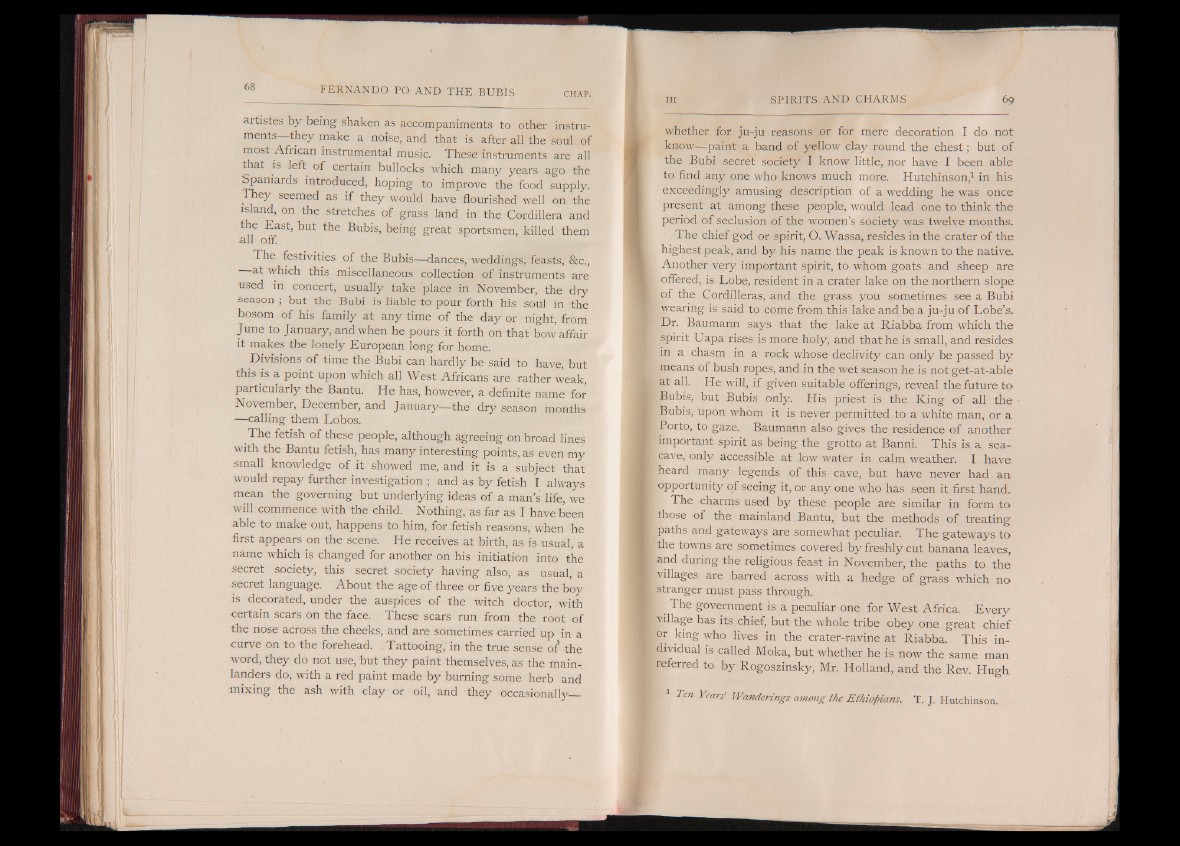
artistes by being shaken as accompaniments to other instruments
they make a noise, and that is after all the soul of
most African instrumental music. These instruments are all
that is left of certain bullocks which many years ago the
Spaniards introduced, hoping to improve the food supply.
They seemed as if they would have flourished well on the
island, on the stretches of grass land in the Cordillera and
the East, but the Bubis, being great sportsmen, killed them
all off.
The festivities of the Bubis— dances, weddings, feasts, &c.,
at which this miscellaneous collection of instruments are
used in concert, usually take place in November, the dry
season ; but the Bubi is liable to pour forth his soul in the
bosom of his family at any time of the day or night, from
June to January, and when he pours it forth on that bow affair
it makes the lonely European long for home.
Divisions of time the Bubi can hardly be said to have, but
this is a point upon which all West Africans are rather weak,
particularly the Bantu. He has, however, a definite name for
November, December, and January— the dry season months
’— calling them Lobos.
The fetish of these people, although agreeing on broad lines
with the Bantu fetish, has many interesting points, as even my
small knowledge of it showed me, and it is a subject that
would repay further investigation ; and as by fetish I always
mean the governing but underlying ideas of a man’s life, we
will commence with the child. Nothing, as far as I have been
able to make out, happens to him, for fetish reasons, when he
first appears on the scene. He receives at birth, as is usual, a
name which is changed for another on his initiation into the
secret society, this secret society having also, as usual, a
secret language. About the age of three or five years the boy
is decorated, under the auspices of the witch doctor, with
•certain scars on the face. These scars run from the root of
the nose across the cheeks, and are sometimes carried up in a
curve on to the forehead. -Tattooing,'in the true sense of' the
word, they do not use, but they paint themselves, as the main-
landers do, with a red paint made by burning some herb and
mixing the ash with clay or oil, and they occasionally_
in SPIRITS AND CHARMS 69
whether for. ju-ju reasons or for mere decoration I do not
know— paint a band of yellow clay round the chest; but of
the Bubi secret society I know little, nor have I been able
to find any one who knows much more. Hutchinson,1 in his
exceedingly amusing description of a wedding he was once
present at among these people, would lead one to think the
period of seclusion of the women’s society was twelve months.
The chief god or spirit, O. Wassa, resides in the crater of the
highest peak, and by his name the peak is known to the native.
Another very important spirit, to whom goats and sheep are
offered, is Lobe, resident in a crater lake on the northern slope
of the Cordilleras, and the grass you sometimes see a Bubi
wearing is said to come from this lake and be a ju-ju of Lobe’s.
Dr. Baumann says that the lake at Riabba from which the
spirit Uapa rises is more holy, and that he is small, and resides
m a chasm in a rock whose declivity can only be passed by
means of bush ropes, and in the wet season he is not get-at-able
at all. He will, if given suitable offerings, reveal the future to
Bubis, but Bubis only. His priest is the King of all the
Bubis, upon whom it is never permitted to a white man, or a
|Porto, to gaze. Baumann also gives the residence of another
important spirit as being the grotto at Banni. This is a sea-
cave, only accessible at low water in calm weather. I have
‘heard many legends of this cave, but have never had an
opportunity of seeing it, or any one who has seen it first hand..
The charms used by these people are similar in form to
those of the mainland Bantu, but the methods of treating
paths and gateways are somewhat peculiar. The gateways to
the towns are sometimes covered by freshly cut banana leaves,
and during the religious feast in November, the paths to the
villages are barred across with a hedge of grass which no
stranger must pass through.
The government is a peculiar one for West Africa. Every
village has its chief, but the whole tribe obey one great chief
or king who lives in the crater-ravine at Riabba. This individual
is called Moka, but whether he is now the same man
referred to by Rogoszinsky, Mr. Holland, and the Rev. Hugh.
j 1 Ten Years' Wanderings among the Ethiopians. T. J. Hutchinson.